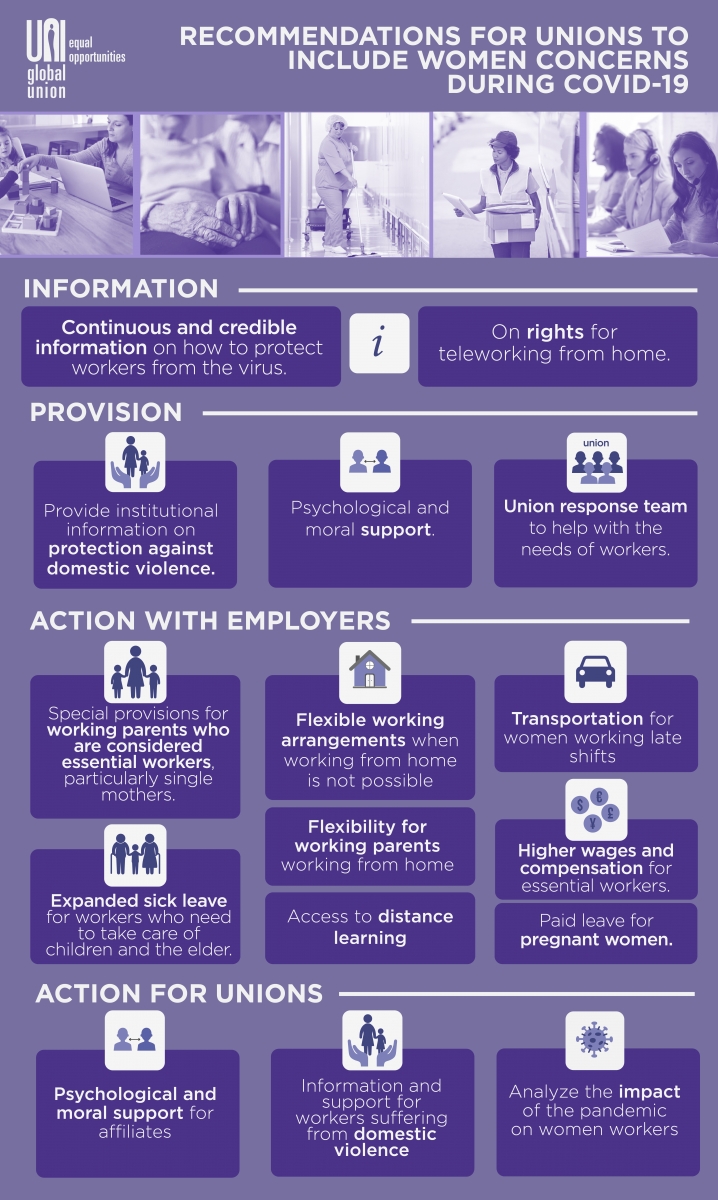The coronavirus pandemic is having a disproportionate impact on women workers, say UNI Global Union affiliates as they propose measures to protect and support women during the global health crisis.
According to the ILO, the majority (58.6 per cent) of employed women worldwide work in the service sector, which is represented by UNI. But women are also the primary caregivers to children, the elderly, and the ill, with many putting in a second shift when they finish their paid work.
“Women who are single mothers, widows or divorced are particularly affected by the closure of schools. Taking care of their families and complying with their work responsibilities creates very difficult home environments,” says Nawja Lekhaila from UMT, Morocco.
For those who can work from home, cultural and social norms often impose on women the burden of household work, which in turn has an impact on their performance.
“The biggest need for many of our women workers is that employers understand that workers cannot be measured on their performance. Working from home is not the same as working in our regular workplaces,” says Stella Dinyake from SASBO union in South Africa.
Women workers also make up the majority of precarious workers, a situation that exacerbates the vulnerability of this group in times of crisis.
“In Chile, childcare services are collapsed and many women, who are the heads of their household and/or single mothers, do not have the means to leave their children to go to work,” explains Viviana Catalan from CONAGRA, Chile.
This is a situation that repeats itself throughout the world for women who hold jobs in industries and sectors without protections such as paid family leave and paid sick leave, leaving them unable to miss days of work to care for children or elderly relatives. The inability of women to stay home when sick with the coronavirus clearly creates an additional danger for everyone.
UNI General Secretary, Christy Hoffman, says:
“Now, more than ever, it is the time for unions to stand up for women and bargain collectively with employers to ensure that women are not putting themselves, or their families at risk, as they struggle to cope with the combined commitments of care and work.”
Unions around the world are mobilizing to protect workers and work with employers and governments to mitigate the effects of the COVID-19. But more needs to be done to make sure that existing gaps affecting all marginalized people will not continue to grow.
“During crises, marginalized and vulnerable groups suffer the most and the possibility of widening existing gaps such as the gender wage gap, is ever growing. If we, as unions, can help raise awareness on the impact this pandemic has on women, if we can help protect them and minimize the impact by adding a gender perspective to our work, we will succeed in protecting the most vulnerable and even help in narrowing existing gender gaps,” says Veronica Fernandez Mendez, Head of UNI Equal Opportunities.
In a survey carried out by UNI Equal Opportunities, women representatives from UNI affiliates have highlighted a series of measures that could be taken in order to help to mitigate the impact of COVID-19.
They include:
- Expanded access to paid sick leave for workers who are unwell
- More and better communication and adoption of measures regarding occupational health and safety
- Childcare support for working parents, with particular emphasis on single mothers
- Providing more information for workers on their rights and how to work from home in the best possible conditions
- Work with employers to protect workers and take the necessary measures to prevent and avoid the spread of the virus
- Negotiation of collective agreements that will allow flexible working with staggered hours to limit social contact when home working is not possible
- Advances in payment of salaries until social benefits kick-in
- Continue the spread of credible sources of information
- Special protection for women who are pregnant
- Provide psychological and moral support
- Have emergency response teams to help deal with the effects of the virus
- For workers in the healthcare sector, focus on their care and safety; including proper rest for workers under pressure, direct patient care when they are at risk and, when vaccinations are available, to give them priority of evaluation and treatment
- Unemployment insurance for workers who need to stay home, have reduced hours or missed shifts
- Ensure training opportunities so that women are not at a disadvantage if they cannot work



